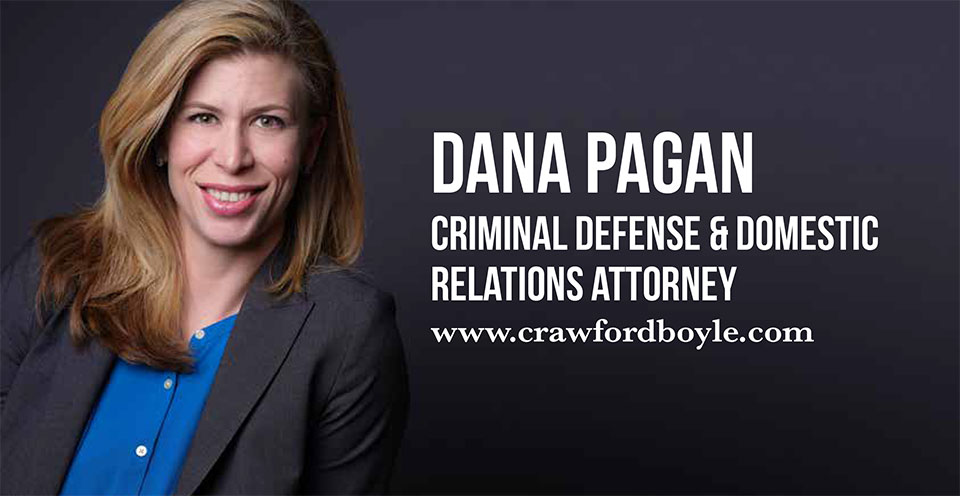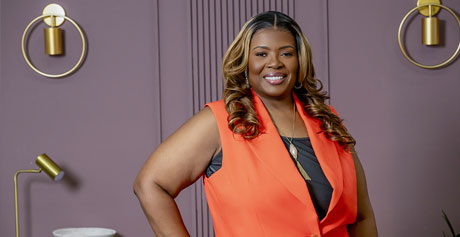She’s a Skilled Lawyer Who Knows the Law & Her way Around the Courthouse. Meet Criminal Defense & Domestic Relations Attorney Dana Pagan.

Q: Why did you decide to attend law school?
DP: I attended law school because I wanted to have a challenging career and I wanted to help people. My undergraduate degree is in Criminal Justice, so I have always had an interest in the criminal justice system and the theories behind crime and punishment.
Q: What was your first job? And how did it shape or impact you?
DP: Both of my parents owned their own businesses, so my first jobs were working for both of them as early as 12 or 13 years old. Watching my parents, I learned that success only comes through hard work and dedication to your profession. I saw my parents work evenings, weekends, and holidays in order to get jobs done. Working with my dad taught me how important customer service and your reputation for caring for your clients is in the business world. Working with my mother, I learned to pay attention to detail, to be precise in my work, and how to manage time effectively to reach deadlines without losing my sanity.
My first “real” job outside of family businesses was working as a clerk at a plaintiff’s personal injury law firm in Washington, DC. There, I got my first taste of litigation, learned about how to negotiate cases, and began to understand the value of having an amazing support staff in a law firm. Having the right team beyond the attorneys in a firm makes all the difference in how a firm runs, how attorneys are able to manage their cases, and the overall experience each client will have in the firm.
Q: Can you share with our audience your experience working as Assistant Attorney General for the District of Columbia?
DP: When I worked as an AAG in DC, I was assigned to the Mental Health Section of the Office of the Attorney General for the District of Columbia. Our section dealt solely with individuals diagnosed with Severe and Persistent Mental Illness (SPMI) and/or developmental disabilities. My work focused primarily on adults with developmental disabilities and some dually-diagnosed individuals. While I technically represented the District of Columbia in commitment hearings where individuals would be committed to the care of the District due to their inability to care for themselves, I often found myself advocating for the individual’s rights and fighting for the individual to live in the least restrictive, most socially integrated setting possible and to have as many rights and freedoms as a non-developmentally disabled individual would enjoy. I filed a series of nine Writs of Mandamus asking that the judiciary be ordered to release individuals be released from commitment to the District when it was no longer clinically appropriate to maintain commitment and when ending commitment would be the least restrictive legal status for the individual. Further, I served as the section liaison to the Public Safety Division and became involved in criminal cases involving developmentally disabled wards of the District.
In addition, I worked with my dear friend and colleague, AAG Neha Patel, to help secure guardians or other healthcare decision makers for hundreds of wards of the District. It was an extremely varied and diverse position that exposed me to areas of law I didn’t even know existed when I took the job.
Q: What has been the most interesting legal issue you’ve dealt with in your legal career?
DP: The most interesting issue I’ve dealt with in my career has been the issue of voluntariness and consent in the DUI arena. This is easily the most heavily litigated issue in Georgia criminal law in the last decade. When I worked in the Gwinnett County Solicitor’s Office, we engaged in appellate litigation in over 30 cases in the three years between 2015 and 2018 with most of the cases centering on the issue of consent/voluntariness in DUI cases. What started out as a narrow issue of determining if someone gave valid consent to take a State administered breath test in a DUI scenario grew to questions of how Georgia’s protections against illegal search and seizures differ from the 4th Amendment protections under the U.S. Constitution, what amounts to a protected act under Georgia search and seizure law, and what the appropriate constitutional construction should be in search and seizure cases. It felt like issues kept sprouting out of each new case beyond the original questions presented and we were constantly having to reassess DUI cases considering changes and challenges to the law. There was never a dull moment when handling DUI cases in those years.
Q: Tell us one of your most memorable moments in your career?
DP: As a prosecutor, I tried a case involving a gentleman who was charged with his third or fourth lifetime DUI. It was clear that he had a significant problem with alcohol, but he was not ready to acknowledge that issue. I tried the case, the jury convicted the gentleman, and the judge sentenced him to jail. He was none too pleased with me at that point. About a year later, a man came up to me out in public one weekend and asked me if I remembered him. It was the man from that case. He shook my hand, thanked me, and told me I’d saved his life through that case.
As a defense attorney, the most memorable experiences have been working with clients with SPMI or substance abuse issues. Seeing those clients finally take control of their issues and helping them work toward having stable, productive, happy lives is always a wonderful experience.
Q: What advice would you give to young women who want to pursue a career as an Attorney?
DP: I have told young women aspiring to be attorneys this many times over- be sure that being an attorney is what you want to do not who you want to be. Being an attorney can be an all-consuming career if you let it take over your life. When you allow “attorney” to become your identity, you can lose perspective and the client is no longer the center of the case. People come to us in their worst moments - when they have been victims of crime, when they have lost a loved one, when their marriages are dissolving, when they are fighting with their business partners, when they have been charged with a crime- and the weight of holding those chapters of another person’s life in our hands is insanely heavy. It is hard not to take your cases home with you when you leave the office. It’s hard not to let work bleed over into your family time. My advice is to take your cases seriously, value your clients, do good work, but also remember to turn it all off, step away, and just be human, too. Attorneys have some of the highest levels of burnout, substance abuse, and mental health issues of any profession. “Remembering that working as an attorney is what you do, but not who you are, lets you maintain some balance in your life.” A balanced attorney is best able to serve her clients and to live a happy life outside of work.
Q: What’s one lesson you’ve learned in your career that you can share with our audience?
DP: Through my work, I have learned, in most cases, people just want to be heard. Whether working as a prosecutor, criminal defense attorney, or divorce attorney, the common thread in every case is that there is someone who simply needs to tell their story and be heard. Often, taking ten minutes to allow someone to say what they feel needs to be said can move a case forward toward settlement more than hours of litigation ever could. As a prosecutor, I had defendants thank me for at least hearing them out even when they were ultimately sentenced to jail. As a defense attorney, my clients have a story to tell and need help having that story told. In divorce cases, the parties each hold a different side of the same story and have a desire to have their version of the story told. In this profession, listening is far more valuable than talking. The same can be said for life outside of the courtroom, too.
Q: Can you share with us the story behind your rescue dogs.
DP: I absolutely love my four dogs! Scarlet was adopted from a rescue in North Carolina and Champ was adopted from the Society of Humane Friends of Georgia. Ranger and Sarge were found buried alive together in a drainage pipe in a rural area of North Georgia when they were puppies and I adopted them a few days after they were found. These are the four cuddliest, sweetest, funniest pack of dogs I’ve ever known. There is something special about the love of a rescue dog!
Four Things About Attorney Dana Pagan
1. What place you always dreamed about visiting?
I would love to go to Iceland and see the Northern Lights. The pictures look breathtaking and I can’t wait to see the country in person one day.
2. If you were a superhero, what would your special powers be?
I have a mild obsession with all things Wonder Woman, so of course I would want her powers. What attorney wouldn’t want the power to be able to make people tell the unfettered truth?
3. What app can’t you live without?
I don’t get too fancy with apps. As long as I can text with the people I love, I’m good!
4. Favorite dessert?
Strawberry shortcake is pretty hard to beat


